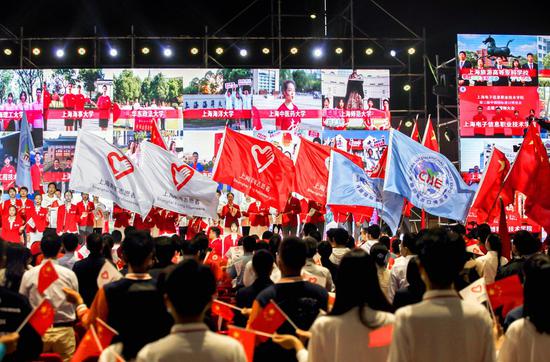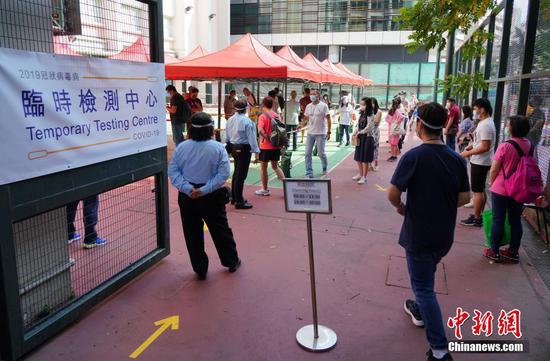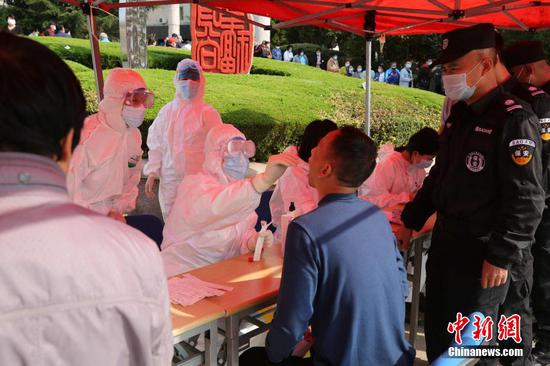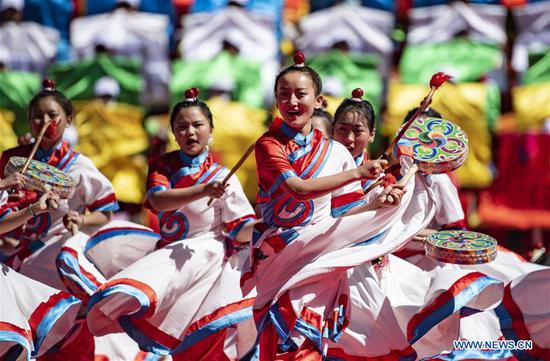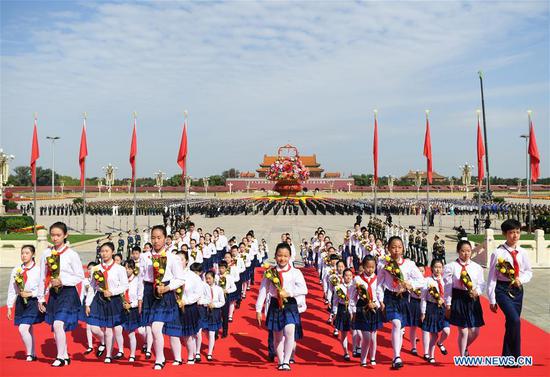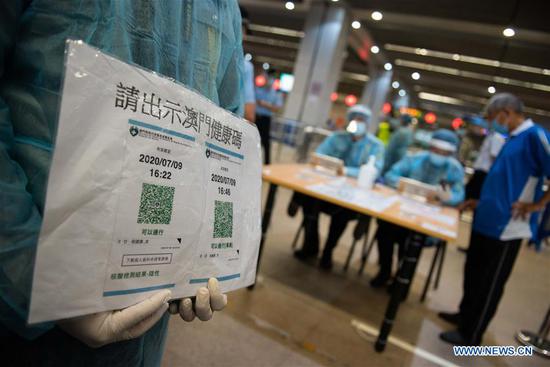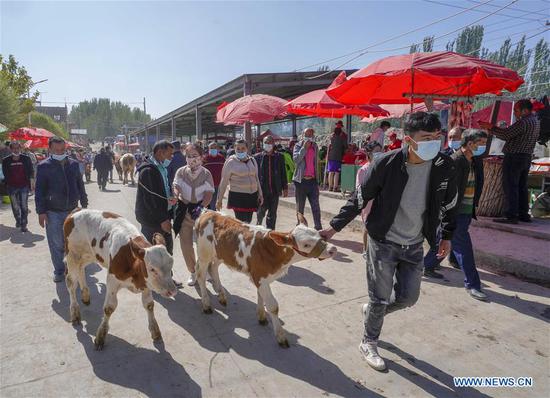3. Ethnic Minorities in Xinjiang Have Been Ensured the Greatest Degree of Decent Work.
In 1999, the International Labor Organization (ILO) put forward the concept of “decent work” for the first time, meaning productive labor, that is, through promoting employment, strengthening social security, safeguarding the basic rights and interests of workers, the government, enterprise organizations and trade unions carry out tri-party consultation and dialogue to ensure that laborers work under the conditons of freedom, justice, safety and dignity. Xinjiang has responded positively to the ILO initiative and made remarkable achievements in promoting decent work for ethnic minorities to the greatest extent .
1)Those Going Outside to Work Get Relatively Higher Income.
According to Xinjiang Regional Bureau of Statistics, in 2019, the minimum monthly wage in Xinjiang ranged from 1,460 yuan to 1,820 yuan in four grades, but through going outside to work, many people’s actual income was much higher than this standard. For example, Abduqeyum Abla, a farmer in Muji Township, Pishan County, Hotan Prefecture, saw the recruitment information of a fishery company in Yantai City, Shandong Province, in the bulletin board of the village Party committee, and took the initiative to apply for the job. He earns more than 5,000 yuan a month after taking up the post. Ablimit Matkorban, a farmer in Moyu County, Hotan Prefecture, and his wife, Azgul, have gone to work in Guangdong Province. The couple, who earn more than 8,000 yuan a month, have become “model workers” in their village. Reyhangul Imir, a farmer from a poor household in Ojma Township, Akto County, Kizilsu Kirgiz Autonomous Prefecture in Xinjiang, sent back more than 100,000 yuan to her family in the four years she spent working in Cixi City, Zhejiang Province. With the money, her family has built a new house and bought new furniture. The family conditions have improved significantly, and the home environment has been completely changed. Habibulla Mamut from Aksu City applied for and got a job with an electrical appliance company in Hangzhou, and earned an annual income of about 55,000 yuan, lifting himself out of poverty in just one year. The investigation team learned in Huangdi Township of Shache (Yarkant) County, Kashgar Prefecture, that Miradil Memet and his wife, having read the recruitment information from the town’s labor and social security office, felt that the jobs were suitable for themselves, so they applied for the cleaning jobs with a property management company in Karamay City. The couple told the investigation team that they are happy with their current jobs which offer free board and loging, and that they earn more than 6,000 yuan per month, far more than farming at home. Maryam, a farmer in the Xiahuangdi Village of Ahya Town, Wushi County in Aksu Prefecture, came to Aksu City three years ago after a friend introduced her to a textile company here, and is now a skilled worker.“I get a fixed salary of 3,000 yuan a month, and the factory provides free meals and accommodation,”she said. Elyas Memet, a 21-year-old young man from Kizilsu Kirgiz Autonomous Prefecture, works for an energy chemical company in Xinjiang and earns 6,000 yuan a month, which is equivalent to his half-year income from farming at home. Many people have built new houses in their hometown, bought cattle and sheep, and whatever they need after making money from working outside their villages. By going out for employment, they have earned far more than they could from farming or idling at home, and started to live a happy life with better conditions.
2)The Ethnic Minorities’Right to Freedom of Religious Belief Is Protected.
The majority of ethnic minorities who go out to work believe in Islam. The government respects and protects their right to freedom of religious belief, and facilitates to meet their normal religious needs. When ethnic minorities go out to work, government officials tell them about the number and location of local mosques. Their religious activities, such as worshiping at the mosque and fasting during Ramadan, have not been interfered by any organization or individual. There are no restrictions on religious activities carried out in accordance with the law. “It’s free to worship here. We can go to the mosque at any time after work, and there has never been any restriction,” said Ahmetjan Omar, who works for a company in Nanjing and goes to a nearby mosque to worship with his ethnic minority co-workers. “We usually go to the mosque after work. We are free on Saturdays and Sundays, and we go there to pray early in the morning,” said his co-worker Memet Yaqup. “When it is Ramadan, we fast, and the boss thinks it’s our right and we have never been interfered in that,” said Iliham Memet, who worked for a company in Mianyang City. “On Lesser Bairam, community workers and our bosses visit us and celebrate the festival with us by having dinner together in the factory halal canteen,” said Muhtar Ibrahim, a co-worker of Iliham. Abdullah Turghun, who has been running a restaurant in Beijing for eight years, closes his restaurant every Ramadan. “Fasting has been my habit for years, and no one has ever banned me from fasting,” he said. The investigation team learned that the religious activities of the Uygur people in Beijing are completely free and that no one has ever interfered. “We do not interfere with them, and the mosques are always open,” said the director of the Dongzhimen Mosque Management Committee, who articulated his respect for the worship of ethnic minorities. All these reflect the unrestricted normal religious activities of ethnic minorities in other places in China.
3) The Ethic Minorities Enjoy a Dignified Life
Halal diet is guaranteed. The investigation team found that the halal catering needs of ethnic minorities in the enterprises in other provinces are guaranteed. The canteens have employed halal catering chefs to ensure the halal food supply. An enterprise in Tianjin has opened a halal canteen for ethnic minority employees, where chefs are recruited from Xinjiang and meals are prepared according to halal eating habits. In the kitchen of an enterprise halal canteen in Nanchang City, the investigation team saw large pieces of lamb and beef piled on the chopping board, and eight Uygur chefs were busy cutting meat and washing dishes. “We went to the grocery market to buy lamb, beef and fresh fruits and vegetables, and we have made menus that are different every day to cook delicious meals for everyone,” said Abdurehman Erkin, a chef from Kashgar’s Shufu County. When the investigation team arrived at a company in Mianyang, it was lunchtime, so they ate together with the ethnic minority workers. The main food included hand-pulled noodles, pilaf, rice and steamed buns, and the dishes served with noodles were fried lamb with celery, black fungus, green peppers and tomatoes. The pilaf was served with large pieces of lamb and side dishes. The foods were completely halal. All these demonstrate the local governments and enterprises’respect for and protection of the eating habits of ethnic minorities.
Those who go out to work are also ensured good living conditions. The investigation team learned that many enterprises provide good accommodation for their employees. Twenty-four enterprises that the team investigated have built employee apartments or rented dormitories for employee accommodation in or nearby the factory. A cotton textile enterprise in Tumushuk City invested hundreds of millions of yuan in building staff apartments equipped with toilets and other facilities. Its employees pay no or just symbolic low fees for accommodation, water, electricity and most of other services. There are also supermarkets, restaurants, barber shops, mobile phone business offices and other supporting facilities in the neighborhood. The investigation team found in an enterprise in Fuzhou that its ethnic minority staff dormitories are fully equipped with television, air conditioning, washing machines and all necessary living facilities. In an enterprise in Nanjing, the ethnic minority employees’dormitories are even equipped with refrigerators.
The good living conditions enjoyed by ethnic minorities working outside their hometown are also supported by news reports. According to a 2017 news report, 840 people from Lopu County, Hotan Prefecture working in a company in a Chinese inland city, lived in en-suite and fully-equipped dormitories with 24-hour hot water and air conditioning, which were much better than their conditions at home. Another report in 2019 said that ethnic minorities working in an inland company enjoyed free board and lodging. The company had Xinjiang-native chefs, a halal canteen, a dance hall and a kindergarten. It also provided couple employees dormitories with double bed, wardrobe, desk and air conditioning. According to another news report in 2019, after coming to work in a chemical company in Xinjiang, Ametjan Mamut, a villager from Bulaksu Township, Shufu County in Kashgar Prefecture, successfully applied for the company’s affordable housing program in Urumqi, while buying a house in Urumqi was unthinkable for a farmer from southern Xinjiang. These reports show that the living conditions of ethnic minorities who go out to work are better than that in their own homes.
4) Ethnic Minority Women Emancipated Their Minds through Going out to Work.
Over a past period of time, some ethnic minority women in rural areas of southern Xinjiang were bound by extreme thoughts and traditional ideas, which made them extremely conservative and backward in ideology and unwilling to go out to work. The investigation team learned that through employment, the women's minds have been unprecedentedly emancipated. Their vision has widened and their enterprising awareness has increased. Some of them have used the skills they learned to start their own businesses, such as tailor shops, dessert shops, beauty salons, working as the“boss”of their shops. Some went to work in nearby or inland enterprises and got their wages on time, becoming the “pillar” of their families. After taking part in skill training, Tunisa Abdullah of Moyu County, Hotan Prefecture, started a tailor shop which provided jobs to 23 women in her village. She often tells those around her, “happy life is not given by others, but created by our own hands.” Aymisha Awut, a farmer from Akto County, works for an electronics company and earns far more than her husband does from farming.“Women can also earn money to support their families and hold up half the sky,”she said. Amina Turghun, a farmer from Makit County in Kashgar Prefecture found her ideas changed a lot after she went out to work.“I never thought that one day I could earn three or four thousand yuan a month, and my two to three months’ salary would exceed my whole family’s income in the previous year. My two younger brothers are still at home, and I’ve been trying to persuade them to come out and see the wonderful world outside and make a difference in their lives,” she said.
5) Social Insurance Has Fully Covered Ethnic Minority Workers.
Xinjiang has comprehensively carried out the program of universal participation of social insurance. Taking the rural ethnic minority workers in cities, people with flexible employment and those working in new business forms as the key groups, Xinjiang has actively promoted and guided them to participate in social insurance, so as to achieve full coverage of social insurance for all workers. By the end of 2019, the number of people insured for basic endowment, unemployment and work-related injuries for urban and rural workers in Xinjiang had reached 18.9052 million, with a coverage rate of more than 90%. Abdukrem Osman from Kashgar said that his company pays 1,240 yuan a month for each employee’s social insurance, including 870 yuan borne by the company and 370 yuan borne by the individual. Migrant workers from Xinjiang to companies in inland China have also signed labor contracts in accordance with the law, with a wage guarantee rate of 100%. Xinjiang strictly implements the State Council's Regulations on Labor and Social Security Supervision. The labor and social security supervision institutions at all levels continue to step up law-enforcement efforts, promptly handle complaints about violations of labor security laws and regulations, rectify and investigate illegal acts of employers that do not cover their employees in social insurance and pay social insurance premiums, thus effectively safeguarding the legitimate rights and interests of ethnic minority workers.
The fact that ethnic minorities have achieved decent work to the greatest degree in Xinjiang is an obvious sign of the development and progress of human rights in Xinjiang, and also a remarkable achievement of the Chinese government’s policy on governing Xinjiang. The allegation of some western think tanks that there is large-scale forced labor” in Xinjiang is profoundly untrue, unreasonable and untenable. It is totally a fabricated lie and slander with political purposes and exposes the real face of the think tanks as lackeys of the US and the West in their anti-China plots. Lies will be exposed eventually anyway. No rumor or slander can shake Xinjiang’s determination to promote the greatest degree of decent work for people of all ethnic groups. With the rapid development of China, the hard-working ethnic minorities will surely achieve more adequate and higher quality decent work and show the world the historic achievements of the development and progress of human rights in Xinjiang.
Investigation Team of the Development Research Center of Xinjiang
(Source:http://english.ts.cn)










